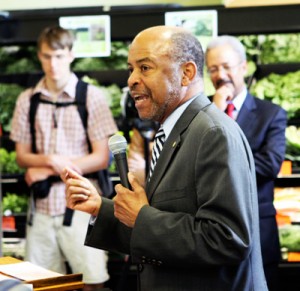Editor’s Note: This is the second in a series of Q&A’s with local political candidates before the primary election on May 20. Our first Q&A, with Algernong Allen, is here. Next up is Matt Wolfe, who is running for a seat in Philadelphia’s City Council. Also, today is the last day to register to vote in the primary. For more information, visit: http://www.votespa.com.
Since assuming office in 1985, James Roebuck has represented West Philadelphia and the rest of the 188th district as state representative, and focused on education as the chairman of the House Education Committee.
Roebuck says he leans on his background as a trained teacher and former Drexel University professor to inform his work as an educational advocate. Through his years of service in the legislature, and under former Governor Ed Rendell, Roebuck lays claims to many successes, including an improved pre-K system and an increase in educational funding. And, on his off-time, he says, you can find him at any local school, reading to grade school students or tutoring second graders.
“To me, education is not just about the way you fund the schools, it’s also about the way you involve yourself in local schools,” Roebuck told West Philly Local.
A week after what he called a “fairly extensive” forum with state representative challenger Algernong Allen, West Philly Local’s Annamarya Scaccia caught up with Roebuck to learn more about his priorities, how his past successes and failures will inform his next term if re-elected, and what it’s like to serve under Governor Tom Corbett.
West Philly Local: Philadelphia is facing a lot of important issues, what are three of your priorities in the state legislature?
James Roebuck: Getting a stable, reliable funding system remains a priority. We need to have, in place, a funding formula that will drive out state dollars in a fair way to all the schools districts in the Commonwealth of Pennsylvania. … The problems of funding education transcend the city of Philadelphia. It affects a large number of districts across the entire Commonwealth … We’re one of three states in the entire country that does not have a funding formula, a way in which we fairly drive out money to school districts by which we educate children.
There’s also the issue of equity in the way we treat traditional public schools, charter schools, [and] cyber charters. We need to have a reliable way in which we assess each of those kinds of education, but particularly that deal with some of the problems in [how] cybers and charters have not been held financial accountable.
We need also to look at ways we encourage young people to consider teaching … get stronger teachers and those teachers are put in every school in a school district, so we don’t have some schools that always get the new and inexperienced teachers and others get the seasoned teachers. We need to look at general accountability in the way we deliver services.
Beyond that … we need to make sure that education becomes a foundation by which we train people to go through their education and come out as productive citizens able to do a job. We need to do more with helping students to choose the right career and knowing how you get there, but also making sure we provide them with the means that they can get the foundation of learning they need to be successful in those careers.
Once of the things I see, over and over again, when I go out and talk to young people is that some of them have an unclear idea of how you translate all those things you’ve said in the school into something that carries you forward in life. … So we have to look at our communities and make sure that we’re not only educating kids, but that there are jobs available for them to take when they complete their education.
A third area of concern for me is environment and the development of the Marcellus Shale industry, what the impact that industry is going to have on our water, land and forest, and that we don’t—at the price of quick economic return—undermine the ecological stability of the Commonwealth. I’ve seen in some states serious incidents of blight and ruining of environmental areas, and I want to make sure that doesn’t happen here in Pennsylvania.
WPL: Now tackling education is a priority for both you and challenger Algernong Allen. You have been in the state legislature for many years, so what advantage does that give you both on this issue and in the state rep role?
JR: My advantage comes from the fact that I am trained as an educator. I am, by background, a teacher … so I came to the legislature well experienced in what it is to be a teacher – well experienced in working with young people and being involved in the educational system.
Harrisburg is based very much upon seniority and your ability to do things in part is years of service, so my years of service come into play. What relationships you build with other representatives and, through those relationships, are able to build coalitions to get things done. I am proud of the fact that it was my leadership as chairman of the Education committee — which came about because of my years of service [and] because I have emerged as a state and national expert on educational policy issues — that allowed me to work very closely with Ed Rendell in shaping an aggressive education policy that did things that, to this day, still help young people. For example, before Ed Rendell became governor, we put exactly no money as a state into pre-kindergarten education. Rendell made that a priority. I helped to get the legislative pieces of that agenda through the legislature … We now have what is probably one of the best pre-kindergarten education systems in the United States. I worked with Ed Rendell on providing funding for full day kindergarten. I worked with the idea of lower class sizes [grades] 1 to 3 so that children get the right foundation to move forward. Those are the kinds of things you can do when you have the experience, the knowledge, and the vision to do it. … It’s my years of experience that help me to have that authority to see how things fit together, to understand the process, but also that builds the alliances that allow me to have success in the area.
WPL: If you were re-elected, how would you use those successes, as well as the failures, to inform your next term?
JR: I look forward to starting in Harrisburg under a newly elected Democratic governor. I think that is critical for my primary area of interest, which is education. You can have a governor as we do now who, in fact, has cut almost a billion dollars out of basic education funding. We are putting less money into education this year than we did in the budget year of 2007-2008. You can’t continue to reduce funding and expect these schools to produce better results. It simply doesn’t happen. So it’s about, in part, prioritizing what you do — putting money in education, which helps young people to learn. Again, I go back to our successes during the Rendell administration, when gradually we adopted what was called the “Coursing Out Study”, which made a commitment to increase the funding in all the 500 school districts in the state so we would equalize funding. … We were getting success in the three years that we had that system. We increased the percentage of state funding at school districts from about 34 percent or 35 percent up to over 45/46 percent. When Tom Corbett became governor, he stopped that. We plunged in terms of the amount of state dollars going into districts … That doesn’t fulfill the constitutional requirement that the state provide a thorough and efficient system of education. You gotta go back to prioritizing education and looking at ways in which we provide financial support, but also the ways in which we make the system work better.
WPL: Since you brought Governor Corbett, how has it been working with the Corbett Administration, especially since there’s a such a disconnect between your priorities?
JR: Well there isn’t any real working with the administration. I think that what you’re seeing is that a person’s come in with a very different set of priorities than I have—and with most Democrats, if not all democrats, and certainly some Republicans. What it has done is it has disrupted the whole educational structure of the state. I understand that Philadelphia is in financial crisis as a school district, but there are many districts in the state that are in worse off than Philadelphia, and that’s happened under Tom Corbett. It’s not just a Philadelphia problem. … But you need to have someone at the top setting the direction who makes education a priority and says, “Yes, I’m gonna fund that.” Now, clearly we have the ability to do that. We don’t tax Marcellus Shale. No other state in the country excludes them from taxation like Pennsylvania does. Even the states that are energy rich like Texas and West Virginia tax (natural gas). We are letting money be lost.
It’s not only Marcellus Shale. You can see it also in our whole approach to national health insurance. We don’t take the Medicaid offer from the federal government, so our citizens are being denied necessary services because we don’t take the federal dollars to provide them with healthcare. There’s such a clear disconnect here between what a government should do and what the Corbett administration is doing that it’s hard to comprehend how disconnected that is.
WPL: What would be your plan of attack on Marcellus Shale drilling if you were re-elected?
JR: We need a tax. I think the shale industry expects to be taxed. They don’t object to being taxed. That’s been demonstrated time and again. It’s the Corbett administration that has said we aren’t going to tax the industry. The reality is you’re not dealing with, “If you tax us, we’re gonna pull out our roots and go someplace else.” The resource that we’re looking at is something that is in the state. It’s not going to change. It’s gonna be here. The reality is, if you’re going to tax them at 5 percent extraction tax or 10 percent, or an extraction tax somewhere in that range, you’re gonna bring in millions of dollars that can help the state meet its financial responsibility. … We also need to make certain that we’re holding that industry accountable for whatever environmental impact is occurring by what they’re doing, by the extraction of the gas. All these things come together, and there’s just been a policy on the part of the current administration that doesn’t fit the pieces together well. Hopefully, with new leadership, we’ll begin to address that in a more meaningful way.
–Annamarya Scaccia









Recent Comments